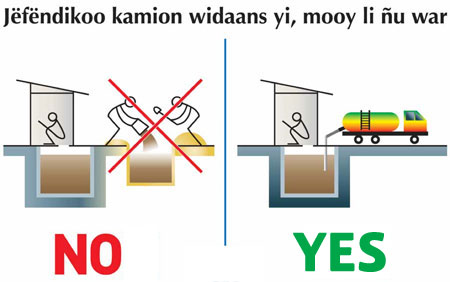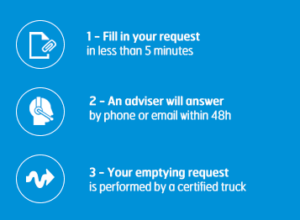Senegal’s Program for Restructuring the Fecal Sludge Market
Realizing the need to address poor sanitation access and improve the entire fecal sludge management (FSM) value chain in Dakar, the National Sanitation Office of Senegal (ONAS) partnered with the Bill & Melinda Gates Foundation to create the Program for the Structuring of the Fecal Sludge Market (PSFSM). This program has two primary aims: provide high-quality, inexpensive mechanical emptying services to consumers while also increasing the incomes of professional emptiers.
Like many major African metropolises, Senegal’s capital city of Dakar faces enormous sanitation challenges. These challenges are largely concentrated in the low-income suburban areas of Pikine and Guédiawaye. Of the almost 1.5 million people living in these areas, about 96 percent use on-site sanitation, consisting of pit latrines at individual households. Because of the shallow water table, pits must be frequently emptied—usually twice a year. However, residents are often unable to access emptying trucks when they need them. Additionally due to weak competition, the cost of emptying is beyond the reach of the majority of the population, who live on less than $2 per day. Therefore, about 44 percent of households resort to manual emptying, which negatively impacts public health and the environment.
Program Innovations
A key aspect of PSFSM is the call center, which serves as a direct link between customers and emptiers. When the customer calls the center and requests emptying at a particular place, date and time, emptiers then submit quotes via SMS. Once the bidding process is over, the lowest bidder and the customer are notified and the service is confirmed. This cutting-edge program allows for easy access to pit emptying and low prices for customers, increased opportunity for emptiers to expand their business, and quality control and monitoring conducted by the call center.
A guarantee fund promotes the development of the fecal sludge emptying industry by enabling companies to improve their equipment and obtain proper licenses and certifications. PSFSM also helps customers save and pay for emptying services by making mobile money services more readily available.
Handing over responsibility of fecal sludge treatment plants (FSTPs) to the private sector has also been essential to PSFSM success. Previously when plants were managed by the government, they were in a state of advanced deterioration, and were not profitable or efficient. With this unique public-private partnership, facilities have been renovated, maintenance and operations improved, administrative organization increased, marketing of dried sludge byproducts advanced, and profitability increased.
Sharing Best Practices
In just three and half years of operation, PSFSM has seen significant success in the areas of efficiency, profitability and stakeholder satisfaction. Want to learn more about the lessons learned from PSFSM? Click here to see their lessons learned report.
ONAS is also a mentor in the RASOP Program because of their development of industry best practices. RASOP, implemented by the African Water Association, focuses on reinforcing the capacities of African sanitation operators on non-sewer sanitation and fecal sludge management through peer-to-peer learning partnerships.






Leave a Reply
Want to join the discussion?Feel free to contribute!